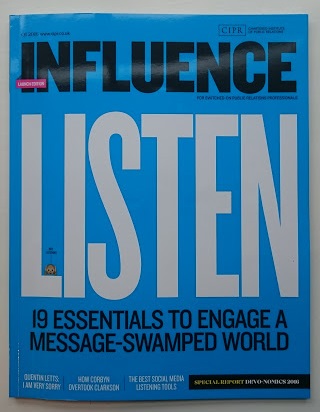 It’s always surprised me that the thinking behind the Welfare State and the National Health Service emerged from the darkest days of the second world war. The Beveridge Report, on which these reforms were based, having been published in 1942.
It’s always surprised me that the thinking behind the Welfare State and the National Health Service emerged from the darkest days of the second world war. The Beveridge Report, on which these reforms were based, having been published in 1942.
How did people have the space to envisage a better future when faced by a daily struggle to survive? How was there spare capacity to ‘think the unthinkable’ when all energies were devoted to the demands of total war?
The answer is now clear to me – and may well have been all along to others. You need an optimistic vision to help you through the darkest days. You need to believe in a better world to cope with the privations of the present situation.
(Another example is the experience of art historian Nikolaus Pevsner. It was while watching for incendiary bombs in London that this German Jewish refugee dreamt up his postwar series ‘The Buildings of England’. By seeing the destruction of historic buildings, he realised the urgent need to record the nation’s architectural heritage.)
I was born in 1961. In hindsight, not that long after the war, but at the beginning of an age of expansion and opportunity. Yet there were anxieties. The Berlin wall was built that year; Dr Strangelove satirised the fears around accidental nuclear war in 1964. The Cold War lasted until the collapse of the Soviet Union three decades later.
Since then, the world has become less predictable, with threats more likely to come from non-state actors such as terrorist groups or even individuals.
We will always be anxious: it’s hard-wired into our survival instincts to scan for threats. Perhaps my generation had it too easy: no conscription, no total wars. A mostly benign economy with rising indices allowing for the accumulation of capital.
What of those born around the turn of the millennium, like most undergraduate students? They’ve been doubly shielded from existential threats because they’re two or even three generations on from the effects of war, of privation and the imminence of death. Yet while work is abundant, it’s less secure and the challenge of matching the capital accumulation of wealthier older generations seems insurmountable. How can you ever save for a pension if you’re stretching to afford a mortgate and a travelcard?
So rather than dreaming of a better future, we have a generation of young adults who’d rather retreat into dreams of childhood. Disneyworld and Harry Potter, created for children, are reassuring experiences for young adults too.
Will the present crisis enable a rethinking and a resetting, similar to the Beveridge Report and the Welfare State? It’s not going to be easy, but the outlines of a more optimistic future are already apparent in these early days of lockdown.
- The climate will thank us. Already, noise and vehicle pollution is lower. Air quality has improved. Long term, our survival depends on collective action, so this is a social experiment that will be studied for its lessons.
- Consumption will slow. We can no longer shop for entertainnment, or buy non-essentials because of wants rather than needs. We already know we needed to stop doing this, but what was finally going to nudge us away from shopping? Will we revert to ‘make do and mend’ or learn greater self-sufficiency? Will having fewer things mean we value them more highly?
- Food. There are already signs of a ‘dig for victory’ approach from some. If nothing else, a vegetable patch in the garden is proving good for health and mental wellbeing, though not everyone has a garden. Beyond this, we were already facing disruption to supply chains and to a crisis in farming because of tariffs and Brexit. Supporting local farms and food producers will see a return to local and seasonal produce, with less year-round choice of luxuries flown from all corners of the globe. It’s a major challenge to feed 60 million from locally-produced food. If farmers are to get a better deal we’ll have to get used to less choice and more expensive food. Not easy, but this reset gives us as chance to rethink. More of us will have to give up or reduce our meat consumption if we’ve any chance to feed all of us.
- Travel. Already, some Instagram feeds and weekend newspaper travel supplements, so popular until so recently, are looking socially unacceptable. Where the generation before mine settled for a week at Blackpool or Scarborough, and mine would backpack to a beach in Greece, my students and graduates seem to think nothing of taking a holiday flight to Bali, while their grandparents book onto oversized cruise ships that are contributing to the destruction of Venice. Now, we’re being discouraged from driving to beaches and national parks for exercise, so will be forced to enjoy spaces closer to home. Since the lockdown is coinciding with spring, many will rediscover the solace to be found in an acute observation of nature.
- Work. This is the big one. Near full employment has been the norm in recent years, but many jobs in hospitality and retailing are threatened. Will these sectors ever recover? Then there’s the question of work-life balance which has been a problem for people in higher paid, ‘white collar’ jobs. Most are now classified as ‘non-essential’, so will people ever return to commuting and the 9-5 lifestyle now they’ve been forced to work remotely and rely on technology instead? The short-term effects of the lockdown will be difficult for businesses and for workers. The long-term effects are unpredictable, but there will be opportunities for business that can prove that they’re essential, and for entrepreneurs and traders to dream up vital new services. Many will involve a return to the past: crafts that can be sold, markets that travel to us, food from farms.
- Sport and exercise. I understand that people are busy and gyms meet a social need in cities. But they’re surely only essential for elite sportspeople. Walking, jogging, cycling, rowing can all take place at home (with minimal equipment) or locally. Climbing the stairs, walking and gardening are probably the best exercise for older people. The loss of major sporting events is damaging to morale, but we will channel our time and energies into other activities. It’s a creative opportunity. Online gaming may come to seem like a good obsession, like chess!
- Community. People need company and a sense of common purpose. Changes to family life and the decline in churchgoing mean that we’ve increasingly been relying on private business to meet these needs. In the short term, volunteers and charities will have to step up but in the longer term there will be opportunities for individuals and social entrepreneurs to meet people’s needs and earn some money doing so.
I don’t mean to gloss over what will be a very difficult and unpredictable time for many. We don’t know who or how many will die. I am above all concerned for a generation of young people who were already anxious and who will now have good reason to be so. We’re all missing the social experience of the classroom and lecture theatre. But that’s why we need to think about their future and to make sure that an opportunity to reset and rethink provides some positive outcomes to offset the obvious and immediate negatives.
 I’d been calling for a publication for CIPR members ever since we lost our free subscription to PR Week, so I was quick to welcome the arrival of Influence magazine last week.
I’d been calling for a publication for CIPR members ever since we lost our free subscription to PR Week, so I was quick to welcome the arrival of Influence magazine last week.
 Public relations (or PR). There, I said it.
Public relations (or PR). There, I said it.